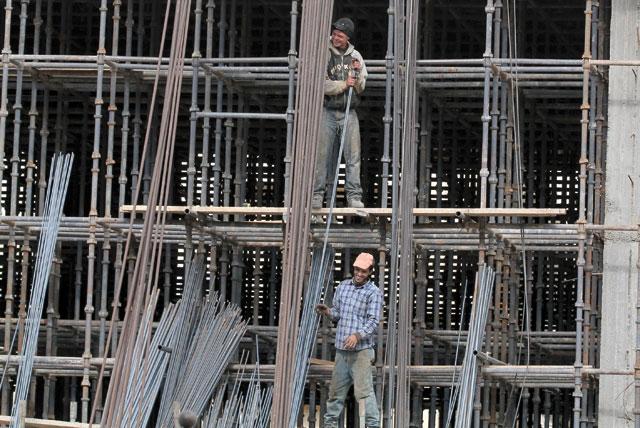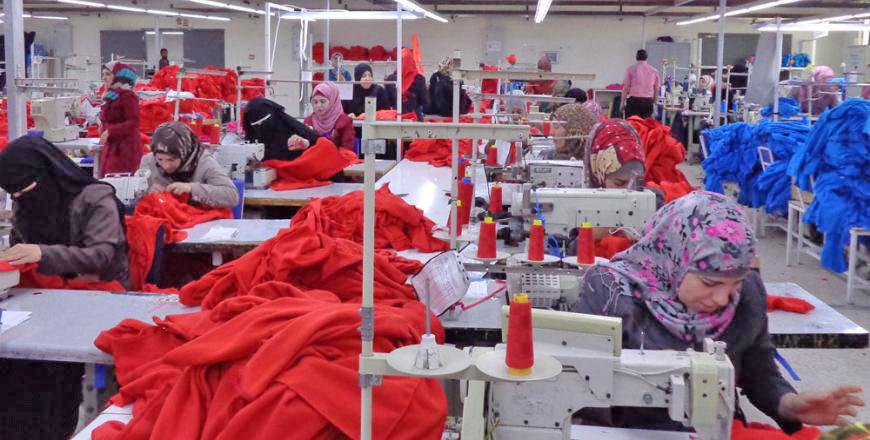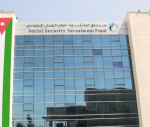You are here
Awareness campaign aims to help refugees ‘ensure their rights’
By Ana V. Ibáñez Prieto - Oct 01,2018 - Last updated at Oct 01,2018

The project aims to facilitate foreign workers’ access to stable employment opportunities (File photo)
AMMAN — The NGO, Care International, on Sunday launched its “Work Permits Protect Your Rights” campaign, aimed at raising awareness among Syrian refugees on the need to obtain work permits in order to secure their rights and prevent abuse in the workplace.
Part of a double project funded by the Ford Foundation and the Austrian Development Agency, the campaign seeks to create links between Jordanian labour market actors and Syrian refugees, facilitating the latter’s access to stable employment opportunities.
Supported by the Ministry of Labour, the International Labour Organisation (ILO) and the United Nations High Commissioner for Refugees (UNHCR), the initiative will also contribute to increasing the economic participation of vulnerable women in the Jordanian labour market, assisting them in their pursuit of sustainable income.
Awareness-raising sessions, video presentations and the distribution of audio materials and informative leaflets are some of the activities that will be implemented within the campaign, which will target the areas of east Amman, Zarqa, Azraq and the Azraq refugee camp.
“Most Syrian refugees are not fully aware of the need for work permits and the procedures to be undertaken in order to achieve a formal status in the Jordanian labour market,” head of the Syrian Refugees Department at the Ministry of Labour, Hamdan Yacoub told The Jordan Times on Monday, stressing efforts by the Ministry of Labour to encourage Syrian refugees to abide by the Labour Code and formalise their status in order to protect their rights.
“Securing their rights and enabling them to benefit from the provisions of the Labour Law is the main purpose of the regulations,” the official continued, lamenting that “many refugees do not know about their rights or believe that the protections stipulated by the Labour Code apply to them”.
“Obtaining work permits would ease their access to employment and define the relationship between employers and workers, providing them with a better perspective to understand the current status of the labour market in Jordan,” he added.
“Engaging with the labour market with a proper work permit would not only help organise the economy, but ensure their rights and provide them with guarantees in terms of job security, freedom and human rights,” project coordinator at the General Federation of Trade Unions (GFTU) Mohammad Maaytah pointed out in a recent interview with The Jordan Times.
ILO Regional Resilience and Crisis Response specialist Maha Kattaa highlighted that obtaining a work permit is “the first step for a refugee to obtain decent working conditions”, as most Syrian refugees working within the informal sector cannot complain about delayed wages, long working hours or any other violations.
“However, most of them are used to working as daily wage workers or in a self-employed regime, and that is what makes it so difficult for them to find a single employer to sponsor them,” Kattaa continued, noting that the ILO is “advocating to have this flexible scheme expanded to other sectors, in addition to opening the door to inter-sectorial work permits”.
“This would put less of a burden on refugees, as they would not have to issue a new permit each time they wish to move to another employer,” she added, noting that inter-sectorial work permits would also reduce administrative work within governmental entities.
Since the onset of the refugee crisis, the Ministry of Labour has issued over 108,000 permits for Syrian refugees, Syrian refugees department officer, Ammar Kalbani, said during a roundtable discussion held in early August, highlighting the government’s efforts to further regulate the status of Syrian workers after pledging to create 200,000 jobs for refugees at the Supporting Syria and the Region conference held in London in February 2016.
“Accordingly, the Ministry of Labour decided to enact a series of measures that would later contribute to the implementation of its undertakings during the conference,” Kalbani said, noting that the measures included the amendment of a number of regulations and instructions related to the issuance of work permits for Syrians.
“In February 2017, work permits for Syrians residing in camps within Jordan began to be issued in coordination with the Directorate of Syrian Refugee Affairs, UNHCR and the ILO, and operation and coordination offices were set up inside the camps of Zaatari and Azraq for this purpose,” Kalbani pointed out, adding that the Ministry of Labour started to issue temporary work permits valid for a period of less than six months in accordance with the “Cash for Work” Syrian employment programme.
“Starting from June 2017, a new list of open professions for Syrians was published to allow Syrians to work in the manufacturing sector,” Kalbani continued, stressing that “this provided them with more employment opportunities in the industrial sector while increasing the number of factories benefitting from the 2016 EU relaxed rules of origin”.
Similarly, on November 2017, the Ministry of Labour introduced a new package of exceptions targeted at Syrian refugees, which included the issuance of flexible work permits for specific sectors, the permission to move from one sector to another without a clearance form in cases in which the permit was expired and the ability to move to another employer without a release form.
Related Articles
AMMAN — Over 16,000 flexible working permits for Syrian refugees employed in the construction sector have been issued over the past year, th
AMMAN — Several labour rights organisations have recently voiced their concerns over the application of the kafalah (sponsorship) system on
AMMAN — The Ministry of Labour has issued over 108,000 permits for Syrian refugees since the beginning of the crisis, Syrian Refugees Depart

















